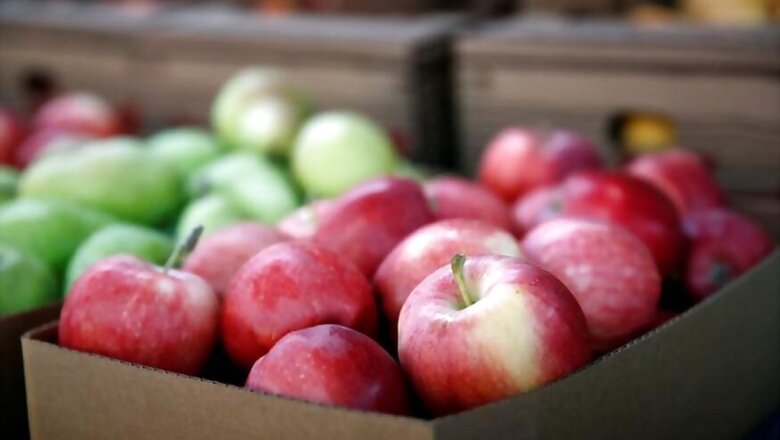
views
Jammu: It is the season of apples. The Jammu fruit mandi, one of the premier markets of its kind in India, would daily receive, on an average, 400 trucks — which is around 2,40,000 boxes of apple. But now, locals say about 40 trucks get unloaded a day – there is a 90 per cent decline in supply.
“This is for the first time in many decades that we are witnessing such a drop,” said Parveen Kumar Gupta, president of the Jammu fruit association.
There are 385 businessmen in the Jammu fruit mandi who receive apples from Kashmir between August and December. September to October is the peak season.
However, after the central government stripped Jammu and Kashmir of its special status on August 5 and restructured the state into two union territories, life in Kashmir has been unsettled.
Initially there were curfew-like restrictions in most parts of the Valley. Later, the government eased the lockdown. Now, life is limping back towards normalcy. Internet and mobile telephony is still curtailed in the Valley. In Jammu, mobile internet remains snapped.
In Kashmir, most of the apple growers are not plucking the yield which is ripe. At places, jihadi groups have allegedly issued threats to growers and buyers. The over Rs 8,000-crore apple industry, which is considered the backbone of Kashmir economy, remains badly hit.
Authorities said this month that apples cultivated in Jammu and Kashmir will be procured directly from farmers by the government-run National Agricultural Cooperative Marketing Federation of India (NAFED) and the entire process will be completed by December 15. The announcement came close on the heels of terrorists threatening some apple growers not to sell their produce in the market following the abrogation of J&K’s special status.
However, fruit traders in Jammu, who mostly rely on the apple business, are worried.
“The traders of our mandi alone have lent around Rs 200 crore to the apple growers in the Valley,” Gupta told News18, while sitting in his office in Jammu fruit mandi.
The market used to be crowded on a typical day in the apple season. But this time, it looks half-empty and the buzz is missing. Gupta, who has been in the apple trade for decades, says he has never faced such a situation.
“Usually, during this season I would get free after 12 to 14 hours. This year, I am sitting in the office the entire day,” said Gupta, who is a third-generation apple trader and has been heading the Jammu fruit association for the past twenty years.
The Jammu mandi is not a consumer market. But most of the apple traders are commissioning agents, who lend money to fruit growers in Kashmir and later sell the crop to the other fruit markets in and outside India.
As time is running out, the businessmen are anxious about their money because apple has a limited shelf life.
“The growers are not sending the crop. It can be disastrous,” said Gupta. “If the apples are not dispatched to markets within fifteen days after the fruit is ripe, it will rot. We will lose the crop.”
If that happens, the businessmen say, they are staring at economic disaster.
“The money which we lent to the growers is mostly from bank loans. This time, our interest amount is going up. If things go on like this, we can de declared non-performing assets (NPAs) by the bank,” Gupta said.
The traders say that some growers who have already taken advance money may sell their crop to NAFED.
“We conveyed to the governor-led administration that we have put advance money in the market and NAFED is going to affect the business,” Gupta said.
The drastic decrease in supply of apple has affected the livelihood of hundreds of labourers as well. Vishal Kumar, 20, used to unload the apple trucks at the market. On a normal day in the peak season, he would earn Rs 1,500 on an average.
“This season would enable me to help my family and sustain in other months, when I do odd jobs,” said Kumar, a resident of Jammu’s Qasim Nagar area.
There are around 3,000 people who have permanent jobs at the mandi. But due to the prevailing situation, Gupta says, most of them might lose their employment. The Jammu trade, by and large, is sustained by the Kashmir market. Most manufacturing units are in Jammu but the consumer market is largely in the Valley.
“We have state intra-dependent trade in Jammu and Kashmir,” explained Rakesh Gupta, president of the Jammu Chamber of Commerce and Industries.
He added that they have not assessed the loss Jammu business has suffered because of the situation in Kashmir. But, he says, the amount is in thousands of crores.



















Comments
0 comment